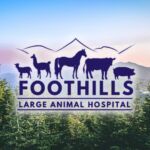Did you battle intestinal parasites with the goats, sheep, or camelids on your farm this year? We only tend to think about parasites in the warm season when the diarrhea is plentiful, the eyelids are pale, the hair coat looks terrible, the weight withers away, or the appetite diminishes. Winter is one of our very […]
Caring for the Pet Pig
A wonderful resource for basic care of your pet pig from the Veterinary Information Network. Direct link: https://veterinarypartner.vin.com/default.aspx?pid=19239&id=5807330
Artificial Insemination in Cattle
WHAT IS ARTIFICIAL INSEMINATION? Artificial insemination is the process of depositing semen from a bull directly into the reproductive tract of a female cow. There is no contact between the bull and the cow. WHAT ARE THE BENEFITS OF ARTIFICIAL INSEMINATION? GENETICS: Artificial insemination allows a producer to use semen from bulls all over the […]
Dehydration is preventable
Our clients can order products from kppvet.com using vet code: WC15047 Reprinted with permission from Kentucky Performance Products The key to prevention is to provide adequate water and supplemental electrolytes. Water makes up about 65% of a mature horse’s body weight. For a 15.2-hand, 1,000-pound horse, that amounts to 650 pounds or 85 gallons of […]
Ration Balancers: Unraveling the Confusion
Ration balancers are a source of confusion for many horse owners. Common responses I get when recommending a balancer for the horse’s diet are, “won’t it make him hot?”, or “isn’t that a lot of protein”. Let’s chat. Protein is made up of amino acids the body needs to carry out normal functions and maintain […]
Raising Weaned Pigs
As the effects of Coronavirus have disrupted corporate pork production, we have seen an influx of feeder pigs in our area being purchased from producers down east. It is important to remember that these specific pigs have been genetically selected over the years to thrive best in a swine barn. They can adjust to other […]
Calving: Stages of Labor
STAGE 1 (PREPARATION: 2-6 hours) During this stage the cow will swish the tail and will have small contractions that are spread apart. She may get up and down and separate herself from the herd. She may graze or eat some while she is up. She may kick at her abdomen with her back feet. […]
Listeriosis in Sheep, Goats, Camelids, and Cattle
What is Listeriosis? Each year, particularly during late fall and winter, we see cases of acute listeriosis in sheep, goats, camelids, and cattle. Listeriosis is caused by a bacteria known as listeria monocytogenes. Listeriosis in animals typically presents in one of two forms: abortions or acute encephalitis. It also has the potential to cause sepsis. […]
Converting a Cow Herd to a Breeding Season
Cow/calf operations are most efficiently ran and most profitable when there is a controlled, defined breeding season. There are a number of reasons to choose to calve at certain times of the year, including labor availability, grass availability for weaned calves, market price of calves at certain times of the year, the ability to create […]
Vaccination and Preventative Care for Cow/Calf Producers
Written by: Justin S. Jornigan, DVM ; Foothills Large Animal Hospital, Nebo, NC Profitable cow/calf herds are most efficiently managed using a controlled breeding season. This allows for a group of calves that can be managed and sold as a group of animals that are a similar size. There is no “one-size-fits-all” approach to calf […]



 Phone: (828) 738-3883 | Fax: (828) 270-3213
Phone: (828) 738-3883 | Fax: (828) 270-3213